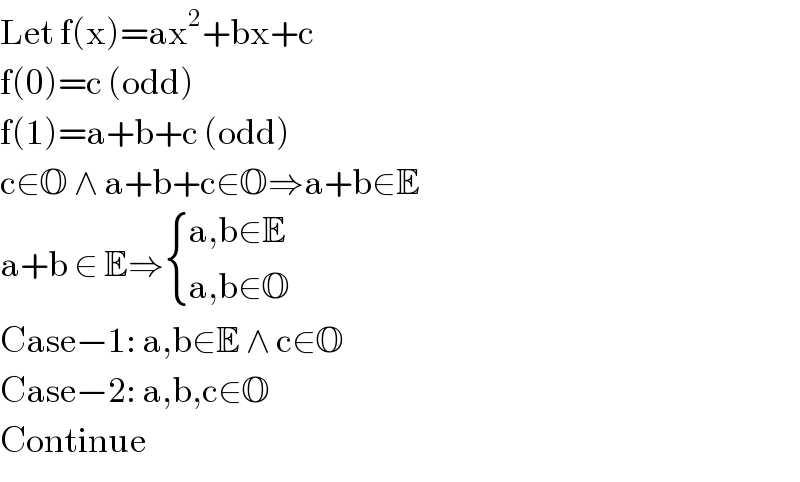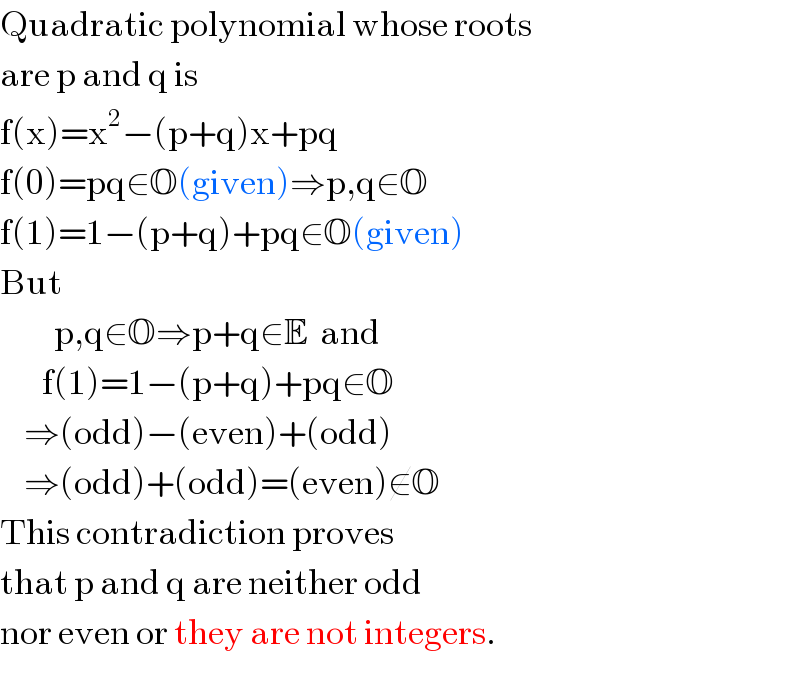
Question Number 19245 by Tinkutara last updated on 07/Aug/17

$$\mathrm{Let}\:{f}\left({x}\right)\:\mathrm{be}\:\mathrm{a}\:\mathrm{quadratic}\:\mathrm{polynomial} \\ $$$$\mathrm{with}\:\mathrm{integer}\:\mathrm{coefficients}\:\mathrm{such}\:\mathrm{that}\:{f}\left(\mathrm{0}\right) \\ $$$$\mathrm{and}\:{f}\left(\mathrm{1}\right)\:\mathrm{are}\:\mathrm{odd}\:\mathrm{integers}.\:\mathrm{Prove}\:\mathrm{that} \\ $$$$\mathrm{the}\:\mathrm{equation}\:{f}\left({x}\right)\:=\:\mathrm{0}\:\mathrm{does}\:\mathrm{not}\:\mathrm{have}\:\mathrm{an} \\ $$$$\mathrm{integer}\:\mathrm{solution}. \\ $$
Commented by RasheedSindhi last updated on 08/Aug/17

$$\mathrm{Let}\:\mathrm{f}\left(\mathrm{x}\right)=\mathrm{ax}^{\mathrm{2}} +\mathrm{bx}+\mathrm{c} \\ $$$$\mathrm{f}\left(\mathrm{0}\right)=\mathrm{c}\:\left(\mathrm{odd}\right) \\ $$$$\mathrm{f}\left(\mathrm{1}\right)=\mathrm{a}+\mathrm{b}+\mathrm{c}\:\left(\mathrm{odd}\right) \\ $$$$\mathrm{c}\in\mathbb{O}\:\wedge\:\mathrm{a}+\mathrm{b}+\mathrm{c}\in\mathbb{O}\Rightarrow\mathrm{a}+\mathrm{b}\in\mathbb{E} \\ $$$$\mathrm{a}+\mathrm{b}\:\in\:\mathbb{E}\Rightarrow\begin{cases}{\mathrm{a},\mathrm{b}\in\mathbb{E}}\\{\mathrm{a},\mathrm{b}\in\mathbb{O}}\end{cases} \\ $$$$\mathrm{Case}−\mathrm{1}:\:\mathrm{a},\mathrm{b}\in\mathbb{E}\:\wedge\:\mathrm{c}\in\mathbb{O} \\ $$$$\mathrm{Case}−\mathrm{2}:\:\mathrm{a},\mathrm{b},\mathrm{c}\in\mathbb{O} \\ $$$$\mathrm{Continue} \\ $$
Answered by RasheedSindhi last updated on 09/Aug/17

$$\mathrm{Quadratic}\:\mathrm{polynomial}\:\mathrm{whose}\:\mathrm{roots} \\ $$$$\mathrm{are}\:\mathrm{p}\:\mathrm{and}\:\mathrm{q}\:\mathrm{is} \\ $$$$\mathrm{f}\left(\mathrm{x}\right)=\mathrm{x}^{\mathrm{2}} −\left(\mathrm{p}+\mathrm{q}\right)\mathrm{x}+\mathrm{pq} \\ $$$$\mathrm{f}\left(\mathrm{0}\right)=\mathrm{pq}\in\mathbb{O}\left(\mathrm{given}\right)\Rightarrow\mathrm{p},\mathrm{q}\in\mathbb{O} \\ $$$$\mathrm{f}\left(\mathrm{1}\right)=\mathrm{1}−\left(\mathrm{p}+\mathrm{q}\right)+\mathrm{pq}\in\mathbb{O}\left(\mathrm{given}\right) \\ $$$$\mathrm{But} \\ $$$$\:\:\:\:\:\:\:\:\:\mathrm{p},\mathrm{q}\in\mathbb{O}\Rightarrow\mathrm{p}+\mathrm{q}\in\mathbb{E}\:\:\mathrm{and} \\ $$$$\:\:\:\:\:\:\:\mathrm{f}\left(\mathrm{1}\right)=\mathrm{1}−\left(\mathrm{p}+\mathrm{q}\right)+\mathrm{pq}\in\mathbb{O} \\ $$$$\:\:\:\:\Rightarrow\left(\mathrm{odd}\right)−\left(\mathrm{even}\right)+\left(\mathrm{odd}\right) \\ $$$$\:\:\:\:\Rightarrow\left(\mathrm{odd}\right)+\left(\mathrm{odd}\right)=\left(\mathrm{even}\right)\notin\mathbb{O} \\ $$$$\mathrm{This}\:\mathrm{contradiction}\:\mathrm{proves} \\ $$$$\mathrm{that}\:\mathrm{p}\:\mathrm{and}\:\mathrm{q}\:\mathrm{are}\:\mathrm{neither}\:\mathrm{odd} \\ $$$$\mathrm{nor}\:\mathrm{even}\:\mathrm{or}\:\mathrm{they}\:\mathrm{are}\:\mathrm{not}\:\mathrm{integers}. \\ $$
Commented by Tinkutara last updated on 09/Aug/17

$$\mathrm{Thank}\:\mathrm{you}\:\mathrm{very}\:\mathrm{much}\:\mathrm{Sir}! \\ $$
